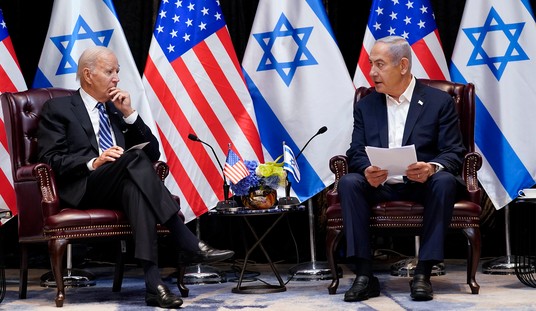Hey, not to distract everyone from the real news of what Brett Kavanaugh wrote in his high-school yearbook, but a trade war between two of the world’s biggest economies got a lot hotter today. The US and China both slapped new tariffs on imports, with the Trump administration’s penalties hitting more than three times the size of the goods targeted by Xi Jinping. The trade war threatens to disrupt both economies, and there’s no easy end in sight:
The commercial battle between the United States and China heated up Monday as the economic powerhouses slapped each other with the largest rounds of tariffs yet, unleashing punitive duties now on roughly half of their traded goods.
President Trump imposed fresh levies on $200 billion in Chinese imports, prompting Beijing to respond with tariffs on $60 billion in American goods, approaching the point of running out of U.S. products to target.
Perhaps mindful of the disadvantage, China tried painting Trump as a “trade bully” in announcing its new tariffs:
The report described the Trump administration’s “America First” policy as an abandonment of norms of mutual respect and consultation.
“Rather, it has brazenly preached unilateralism, protectionism and economic hegemony, making false accusations against many countries and regions, particularly China, intimidating other countries through economic measures such as imposing tariffs, and attempting to impose its own interests on China through extreme pressure,” the white paper said.
China seems to labor under a misapprehension. Contra Melania, Trump has no qualms about being called a bully in negotiations of any kind. In fact, Trump revels in it. Trump got himself elected in large part on a promise to get tough with China and other trading partners to reverse the damage done to American manufacturing over the last several decades. The only way to get the best deal, Trump has argued from the beginning, is to make the others at the table feel enough pain to make serious concessions.
This may be especially true with China, long a bête noire among populists in regard to trade. Getting called a bully by Beijing is practically an endorsement. That’s true even if Trump calls Xi his friend, as CNN’s Steven Jiang notes. Beijing is belatedly coming to the realization that this is not just a transactional issue for Trump, but also a strategic move designed to protect US intellectual property and to keep China from exploiting it as part of their CM2025 project:
Still, it’s going to cost China in the short and medium runs, and the global economy might start feeling the pain. If so, others might start putting pressure on both governments to find an accommodation:
With no settlement in sight, forecasters say the conflict between the two biggest economies could trim global economic growth through 2020. On Monday, the ratings agency Fitch cut its forecasts for next year’s Chinese and global economic growth by 0.1 percentage points to 6.1 percent and 3.1 percent, respectively.
“The trade war is now a reality,” said Fitch’s chief economist, Brian Coulton, in a report. “The downside risks to our global growth forecasts have also increased.”
The next move for Xi is likely not economic, but strategic. If he lets Kim Jong-un off the hook, Trump will lose what leverage he’s managed to gain over the last six months on North Korea. That has long-term consequences for China, too, as it will encourage a rapid military build-up by the US and maybe Japan in the region, but it’s not a bad short-term lever on Trump as long as it doesn’t go too far. Beijing can handle a trade war; they surely don’t want a shooting war on their border.








Join the conversation as a VIP Member